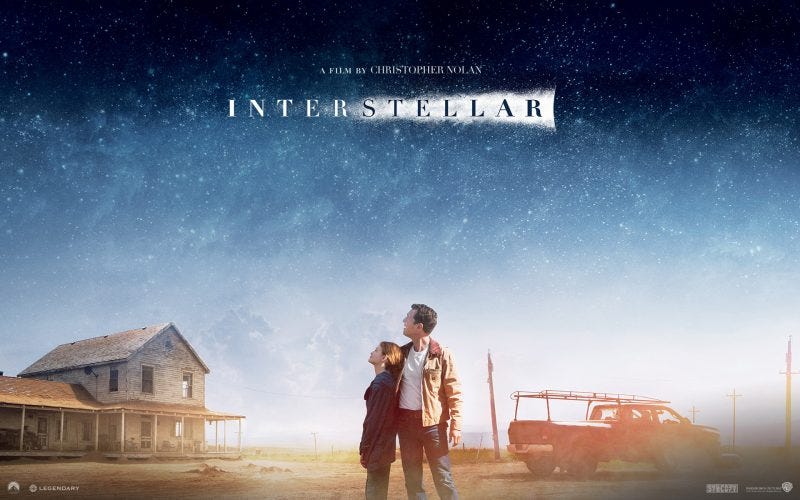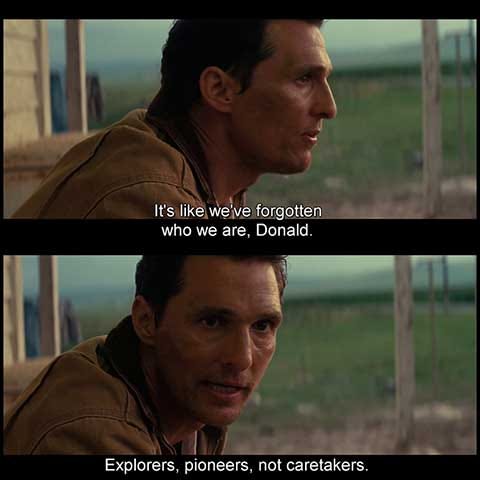Timeless lessons from Interstellar (2014)
You won't just watch this movie. You'll walk away different.

If there was one movie….one movie that I wish I could erase my memory of so I could reexperience it as if I am watching it for the first time, it would be Interstellar.
First released in 2014, Interstellar has aged like a fine wine. And every watch simply gets better.
Because the movie isn’t just a masterclass in filmmaking, acting, musical score and emotional narrative led by one of the greatest minds of the 21st century, Christopher Nolan - it’s a cinematic experience that forever alters the way you see life itself.
I promise that you will never be the same afterwards.
Upon my 4th rewatching (possibly more), I wanted to explore its themes, so spoilers ahead if you haven’t watched it, in which case I urge you to stop reading and put the film on top of your watchlist immediately.
In short, Interstellar is a sci-fi epic that takes place in a future where Earth is plagued by environmental collapse and a former NASA pilot and widowed farmer, Cooper, reluctantly joins a space expedition seeking a new habitable planet to ensure humanity's survival, leaving his small children behind. As he ventures into the unknown, which is affected by time dilation (time in space moves slowly compared to earth), he grapples with the emotional toll of spending years away from his kids, not knowing how long it will take for him to return, if they would still be alive when he returns. Or worse still, if he would even survive the mission.
The question of surviving vs thriving
In a dying world where food is scarce and teachers are branding space expeditions and explorations as propaganda, Cooper vents his frustration with humanity's retreat from exploration to focus on mere survival.
“We used to look up at the sky and wonder at our place in the stars. Now we just look down and worry about our place in the dirt.
It’s like we’ve forgotten who we are Donald. Explorers, pioneers, not caretakers.”
As human beings, we’re endowed with abilities far beyond what we think we are capable of. We are not meant to play it safe and accept whatever limited conditions we are put in. We are made to explore and seek new experiences.
Tough times are meant to jumpstart the dormant human spirit of discovery within us.
In adversity, most succumb.
The few who dare to brave storms?
They expand, they grow, they break out of their limitations.
And they then become architects of a new, amazing reality.
Time marches on relentlessly, irretrievably and faster than we think
In one of Interstellar's most emotionally powerful scenes, Cooper and his team venture to Miller's planet, one of which was earmarked for a potential future home of human beings. They were aware of the time dilation as it was orbiting perilously close to the black hole, estimating that 1 hour on the planet would equate to 7 years on Earth.
However, it was just a theoretical calculation.
Reality turned out to be vastly different.
Their brief excursion resulted in a staggering 23 years passing on Earth.
Upon returning to their space station, Cooper is confronted with decades of video messages from his children.
He watches his son, Tom, grow from a teenager graduating from high school into a weary, married adult.
He finds out that he has become a grandfather, and heartbreakingly, only for a few, mere seconds.
He completely breaks down at the impossible realisation that his daughter is now older than him and he will never get to experience the joys that come with growing old with his family.
This scene always wakes me the hell up on how precious time is.
Granted, we probably won’t experience extreme time dilation unless we end up leaving the Earth and straying near a gigantic black hole, but this is a stark reminder that time still slips away unnoticed, indifferent to our intentions or awareness.
Consequences of ignoring instincts and intuition
After the harrowing experience on Miller's planet, where they have technically spent 23 years and wasted valuable resources, Cooper and his team faced a pivotal decision.
With limited fuel, they had to choose between two remaining planets: Dr. Mann's, who was their best scientist and was still transmitting signals, indicating that he might be alive, and Dr. Edmunds', which had ceased communication, although he shared positive data about the planet’s potential.
Despite Dr. Amelia Brand's advocacy for Edmunds' planet, influenced largely by instinct and personal connection, the team opted for Mann's planet, swayed by his esteemed reputation.
Upon arrival, they found Dr. Mann in cryosleep on a desolate, icy world. Initially presenting his planet as viable for colonisation, Mann's facade quickly unravelled. In a desperate bid for survival after spending years alone in the inhabitable world, he had falsified data to prompt a rescue, ending up killing himself and another astronaut, while damaging their space station in the process.
The lesson here?
Despite lacking concrete data, Brand's initial intuition about Edmunds' planet ultimately proved accurate, as the crew's decision to prioritise Mann's reputation and data had invariably led them astray.
The question of intuition vs facts has often fascinated me.
While empirical evidence and logic are invaluable, it is equally crucial to listen to our hearts and gut feelings, for the entire trajectory of our lives depends on them.
And here I leave you with this question: How do we learn to balance both?






Great insight, Khogulan. Thanks!